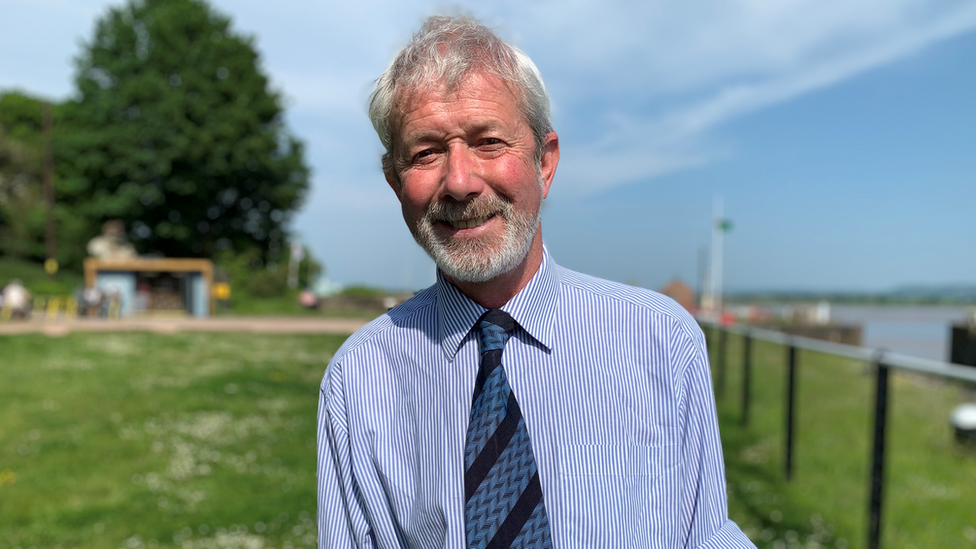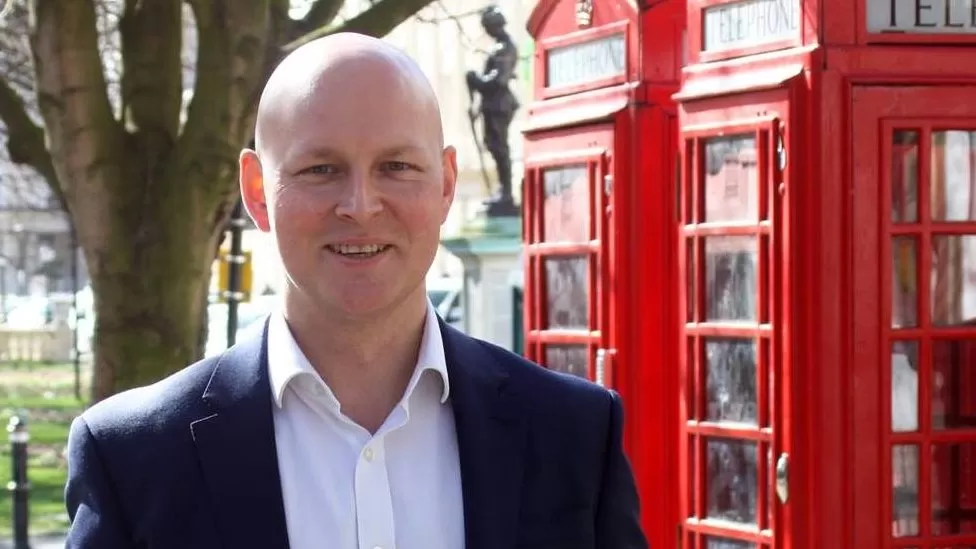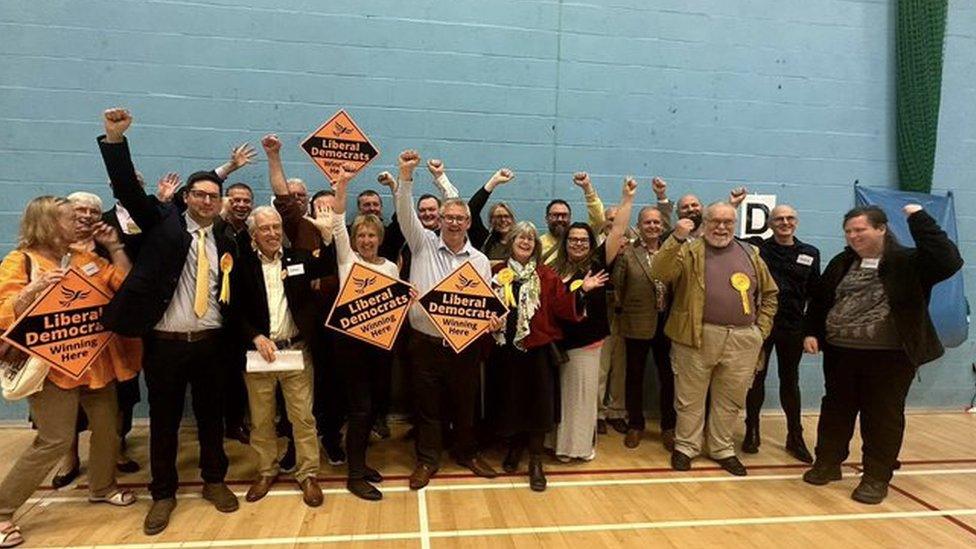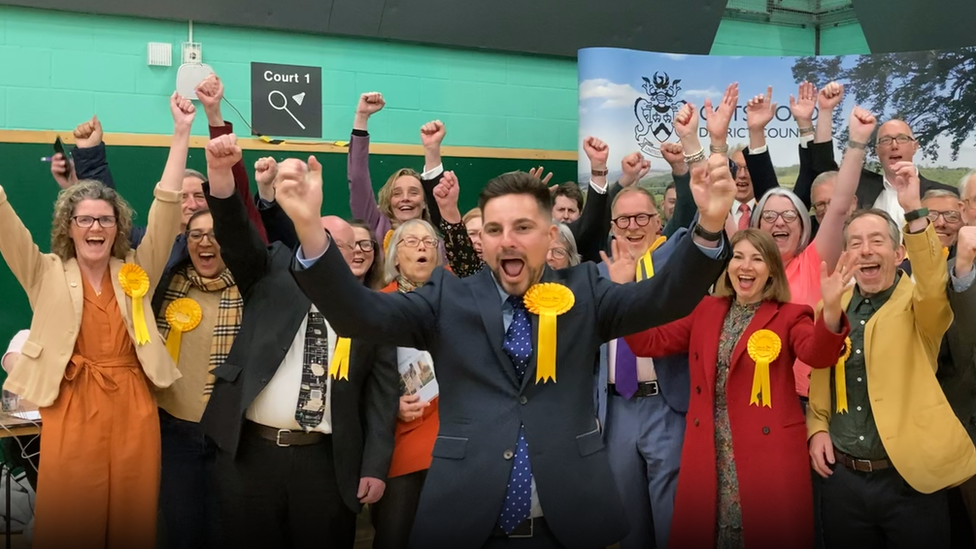Smaller parties look to woo Gloucestershire voters in next election
- Published

Chris McFarling is the Green parliamentary candidate for the Forest of Dean
Voters in Gloucestershire are being targeted by smaller parties ahead of the next general election.
Bolstered by their recent success at the local elections, the Greens and Liberal Democrats are campaigning hard to overturn the county's 'blue wall' of Conservative MPs.
But, political experts have warned local wins do not necessarily translate in the national vote.
The Conservatives have until January 2025 to call a general election.
Both Labour and the Conservatives failed to make any headway in Gloucestershire at the local elections on 4 May.
The Liberal Democrats consolidated their control of Cotswold District Council and became the largest party on Tewkesbury Borough Council, which had been controlled by the Conservatives for more than 15 years.
In the Forest of Dean, the Greens more than doubled their numbers to become the largest group for the first time in the council's history.
'Nothing is impossible'
As a result, the party is targeting the parliamentary constituency, which is currently held by Conservative Transport Secretary Mark Harper.
Chris McFarling is a district councillor for St Briavels, a Gloucestershire County Councillor and the Green parliamentary candidate for the Forest.
He says "nothing's impossible" when it comes to winning the seat and "where there's a chance there's hope".
"The results of this local election gives us hope and there may be a chance we could get a Green MP," he added.
"Politics is changing all the time, and the way we do politics is different.
"The old Labour and Conservative domination is changing. It's not changing fast enough as far as we're concerned, and there is a need for electoral reform," he said.

Max Wilkinson is the Liberal Democrat parliamentary candidate for Cheltenham
The Greens are also vying for the Stroud constituency, which is currently represented by Conservative MP Siobhan Baillie.
In the 2019 general election, the party came in third place behind Labour, who lost the seat. It was widely argued the Green campaign split the left vote.
In contrast, the Liberal Democrats are voraciously campaigning for Cheltenham and what will likely be the newly formed South Cotswolds seat in the next general election.
The party traditionally performs well on a local level, but struggles to translate this success nationally.
In 2019, Liberal Democrat candidate Max Wilkinson lost the Cheltenham seat to the Conservative incumbent and newly crowned Justice Secretary, Alex Chalk, by 981 votes.
Mr Wilkinson, who is standing again, says voters are willing to back smaller parties and does not think the public view this support as futile.
"In Cheltenham it's never a wasted vote for the Liberal Democrats because this seat is always between the Liberal Democrats and the Conservatives," he said.
"Across the country there are a huge number of seats where the Liberal Democrats are in second place to the Conservatives, and we're the only challengers in so many of the blue wall seats across the south of England," he added.
'All disappeared'
Despite optimism from smaller parties, historically there is minimal evidence of correlation between successful local and general election results.
Stephen Fisher, professor of Political Sociology at the University of Oxford, said: "In 2019 we had local elections in the May, and the Liberal Democrats, Greens, independents and housing associations did really well, their best ever results.
"But that all disappeared by the time of the December general election.
"So if that experience is anything to go by it might well be that things might not work out so well in a general election next time for the smaller parties."
Professor Fisher says the Liberal Democrats are doing well in the national polls at the moment and this could help take their numbers above 14 in the House of Commons.
In contrast, he says the difficulty for the Green Party is they "aren't starting in second place" in any constituency, so will have to make a "special argument" to voters.
Ultimately, Prof Fisher believes the contest still remains between Labour and the Conservatives.
Although he is keen to point out that a lot can happen in politics over the course of a year.
"The question of whether Labour get a majority or not is on a knife edge. But at the moment I think they might be reasonably on course for an overall majority, but it's rather close and very uncertain," he said.
Following the local election result, Prime Minister Rishi Sunak admitted the results were "disappointing", but said he did not detect "a massive groundswell of movement towards the Labour Party or excitement for its agenda".

Follow BBC West on Facebook, external, Twitter , externaland Instagram, external. Send your story ideas to bristol@bbc.co.uk
- Published5 May 2023

- Published5 May 2023
